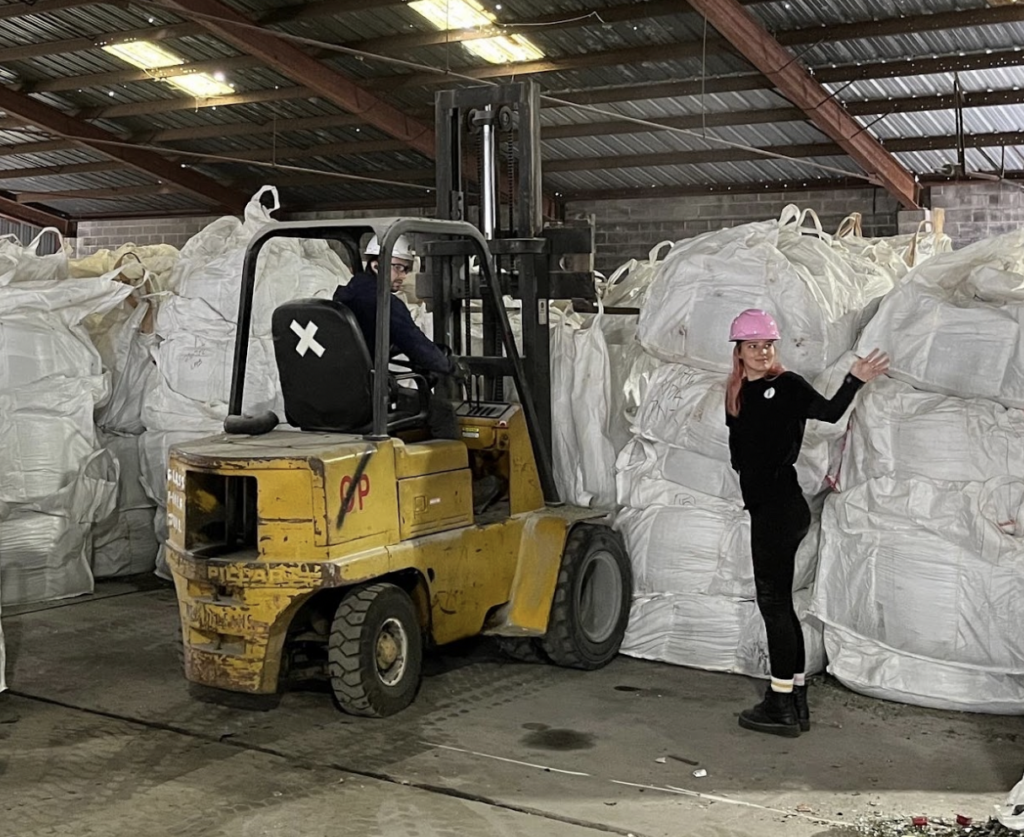ACE INTERVIEW: Franziska Trautmann on Glass Recycling
|
May 27, 2022

Franziska Trautmann is a 24-year-old from a small town in Louisiana. She co-founded Glass Half Full (GHF) in New Orleans to recycle glass into sand for disaster relief and coastal restoration. After growing up in Louisiana, a state that is losing land at an alarming rate and faces more and more intense hurricanes, Franziska became empowered to take action to address the climate crisis.
Gari De Ramos (GDR): When did you first learn about the climate crisis? What was your immediate reaction?
Franziska Trautmann (FT): I first learned formally about the climate crisis in college and I’d say my immediate reaction was definitely not shock. Growing up in Louisiana, I heard my entire life about how we are losing land at an alarming rate on our coast. 100 yards every 100 minutes to be exact. I also noticed hurricanes getting more and more intense throughout my life. So, to me, learning about the climate crisis made things make more sense.
GDR: When did you first decide to get involved in climate activism? How and why did you come to that decision?
FT: I decided to get involved in climate activism formally at the end of college by starting Glass Half Full. Throughout my life, I understood that there were existential threats to our environment, but I never took an active role in doing something about it. When the idea for Glass Half Full came about, I felt that it was time for me to be a part of the solution instead of the problem.

GDR: You’re involved with a group called Glass Half Full. Can you tell me about what this organization does and your role there?
FT: I am the co-founder and CEO at Glass Half Full. We recycle glass in New Orleans into sand and gravel for disaster relief, construction, landscaping, and coastal restoration. I facilitate our partnership with Tulane University and the National Science Foundation to conduct novel research on the use of glass sand in coastal restoration. At GHF, we collect glass through free drop-offs as well as paid pickup services and turn that glass into sand right here in New Orleans. We do every part of the process locally, from collection to crushing to distribution of the products.
GDR: What compelled you to start Glass Half Full NOLA specifically?
FT: I started Glass Half Full because I was fed up with the lack of glass recycling in New Orleans and throughout the state of Louisiana. I wanted to be a part of the solution to not only divert glass from landfills, but turn it into a resource that could help our coast.
GDR: Talk about the connection between glass recycling and the fight against climate change.
FT: Glass can take up to one million years to decompose in a landfill. In the United States, we are dooming billions of pounds of glass to landfills where it will not decompose or turn into anything useful, while at the same time we are losing land at an alarming rate and running out of sand globally. If we could instead divert glass from landfills, turn it into sand, and use that sand for construction or coastal restoration, then we should! We should never doom valuable resources to a landfill when they could be used to combat climate change.
GDR: How does grassroots glass recycling differ from glass recycling on a larger scale?
FT: In the United States, we use a single stream recycling system, which means we dump all of our recyclables into one bin and an MRF (Materials Recovery Facility) has to separate each type of recyclable material for it to actually be recycled. Sadly, in most cities, glass is the last thing to be separated which often means it is completely contaminated with trash. When a recycling facility is starting with mostly trash as a raw material, it is extremely hard to get a viable product out of that. This has caused many cities to stop collecting glass in their curbside recycling programs. When glass recycling is more glassroots, like at GHF, the glass can be collected separately from the usual city-run recycling and a much cleaner, usable infeed of glass can be recycled.
GDR: What does the phrase “climate emergency,” mean to you?
FT: Climate emergency means that we do not have time to wait to take action. Every single person can do something to help combat the emergency we are in.
It is easy to fall into climate doomism or focus on the negatives and feel as though you cannot do anything, but the more we focus on the positives and what we CAN do the more we actually get done!
GDR: Talk about a time you felt proud of the impact you had made through your climate activism.
FT: I am proud every single day of all of the work I have done to make glass recycling a success in Louisiana. I am so proud that we have diverted over 2.2 million pounds of glass from landfills in just two years.
GDR: What is your advice to young people who want to get involved in climate activism?
FT: My advice to young people is to JUST DO IT! Really. I started GHF without any recycling or waste management knowledge. I truly did not know anything about glass or sand or coastal restoration. I knew that I wanted to tackle this issue and I was very passionate about it. So many of us get bogged down in the “what ifs” or the stuff we don’t know, but it is so important to focus on what you do know and what you want to do. That’s why I named our organization Glass Half Full 🙂 It is easy to fall into climate doomism or focus on the negatives and feel as though you cannot do anything, but the more we focus on the positives and what we CAN do the more we actually get done!
GDR: Why is local climate action so important?
FT: Local climate action has RIPPLE effects!
GDR: How can others uplift or support the work you do?
FT: Follow @ecofran and @glasshalffullnola (on Instagram and TikTok) and support our work that way. Locals can volunteer with us and others can donate if they would like 🙂
Want to read more? Check out the ACE Blog!
Join our Youth Action Network
More Blog Posts

Unnatural, Not Unprecedented
For two weeks, residents of Southern California endured a waking nightmare. Parents raced against time – hurrying down the driveway …
Read MoreCrafting a Vision for the Future: My Experience at LCOY USA 2024
Dry and sunny Tempe, Arizona where temperatures have been over 100 F for 113 consecutive days, delegates gathered to attend …
Read More
7 Ways to Weatherproof Your Home on the Cheap (+1 Not-So-Cheap)
As colder weather sets in, understanding how to weatherproof your home is key to maintaining warmth and reducing energy costs. …
Read More